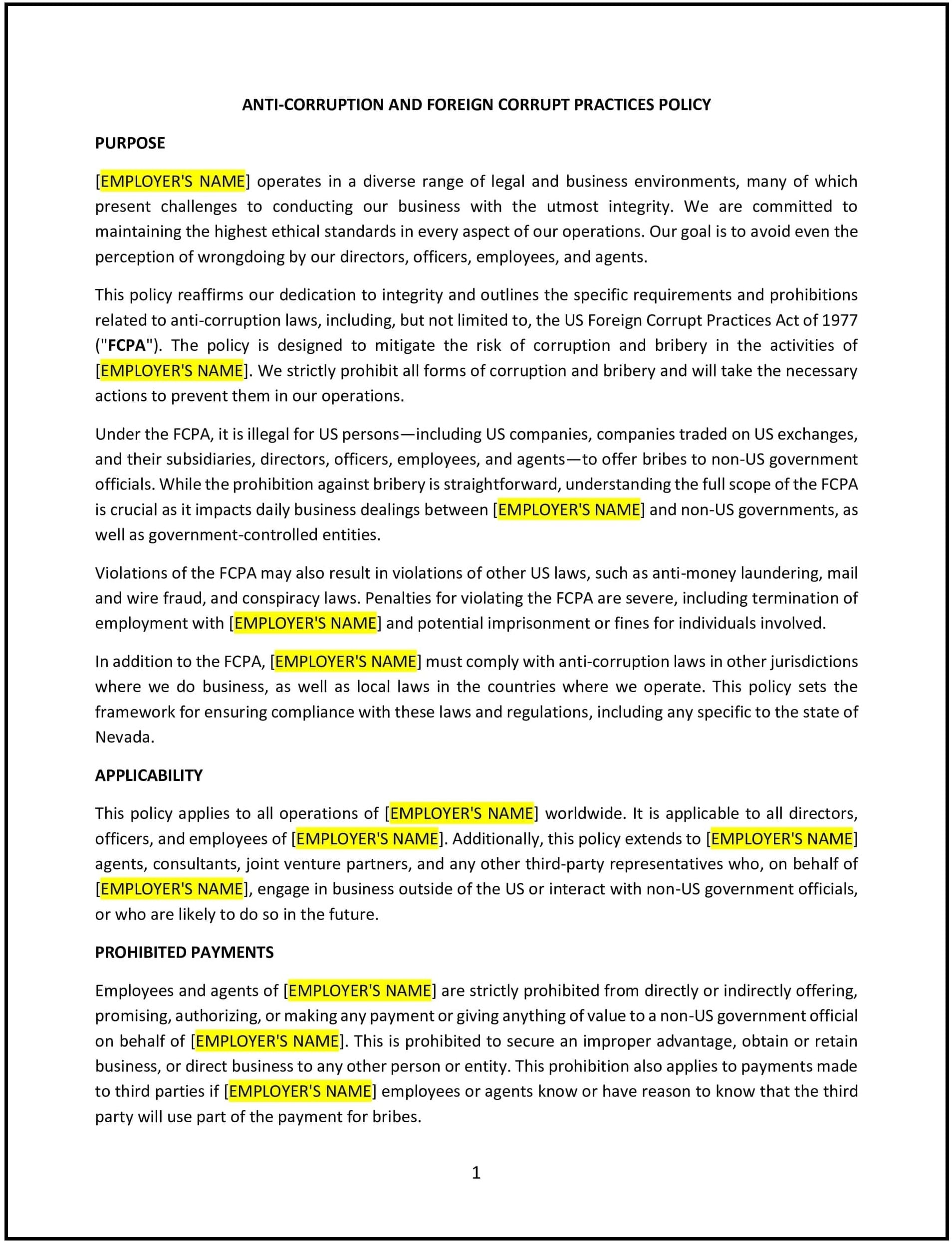Anti-Corruption and Foreign Corrupt Practices policy (Nevada): Free template
Got contracts to review? While you're here for policies, let Cobrief make contract review effortless—start your free review now.

Customize this template for free
/Anti-Corruption and Foreign Corrupt Practices policy (Nevada)
This anti-corruption and foreign corrupt practices policy is designed to help Nevada businesses establish clear guidelines for preventing corruption and promoting compliance with both Nevada state laws and the U.S. Foreign Corrupt Practices Act (FCPA). Whether you are managing internal operations or working with foreign partners, this policy helps ensure that business activities remain transparent, ethical, and free from corruption.
By using this policy, businesses can mitigate legal risks, promote ethical conduct, and maintain trust with clients and stakeholders.
How to use this Anti-Corruption and Foreign Corrupt Practices policy (Nevada)
- Define prohibited conduct: Clearly outline behaviors that are not tolerated, such as bribery, kickbacks, and any form of corrupt or unethical business practices.
- Explain the Foreign Corrupt Practices Act (FCPA): Provide an overview of the FCPA, including its purpose and the kinds of activities it prohibits, such as offering bribes to foreign officials.
- Set reporting procedures: Establish clear procedures for reporting suspected corruption or violations of the policy, ensuring employees know how and where to report any concerns.
- Implement due diligence procedures: Outline the process for conducting due diligence on third parties, business partners, or vendors to ensure that they adhere to the company’s ethical standards.
- Train employees: Specify that all employees, especially those in positions of authority or dealing with foreign clients, should undergo regular anti-corruption training.
- Clarify penalties: Define the penalties or actions that will be taken against employees or third parties found to have violated the policy.
- Encourage transparency: Promote transparency in all business dealings, particularly those involving government officials, intermediaries, or foreign partners.
Benefits of using this Anti-Corruption and Foreign Corrupt Practices policy (Nevada)
This policy provides several key benefits for Nevada businesses:
- Mitigates legal risks: Reduces the likelihood of violations of both state and federal anti-corruption laws, thereby protecting the company from legal consequences.
- Promotes ethical behavior: Encourages employees and business partners to adhere to high ethical standards, strengthening the company’s reputation.
- Enhances transparency: Encourages transparency in dealings with foreign officials and business partners, reducing the risk of hidden corruption.
- Supports compliance: Helps businesses comply with the U.S. Foreign Corrupt Practices Act and other relevant local and international laws, protecting against financial and reputational harm.
- Improves stakeholder confidence: Builds trust with customers, clients, and investors by demonstrating the company’s commitment to ethical business practices.
Tips for using this Anti-Corruption and Foreign Corrupt Practices policy (Nevada)
- Communicate the policy effectively: Ensure all employees understand the policy and its implications through training sessions, internal communications, and regular reminders.
- Conduct regular audits: Periodically review the company’s business dealings and third-party relationships to ensure compliance with the policy.
- Train employees regularly: Provide ongoing anti-corruption training to keep employees informed of legal requirements and how to identify potential violations.
- Foster a speak-up culture: Encourage employees to report any concerns regarding corruption without fear of retaliation.
- Monitor third-party activities: Implement a thorough due diligence process for any third parties or vendors that the company does business with, especially in foreign markets.